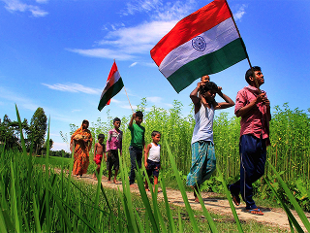United Nations, Jul 22: India is ranked at a low 110 of 149 nations with regard to achieving the Sustainable Development Goals, according to a new index topped by Sweden that shows all countries face major challenges in achieving these ambitious goals.
 The Sustainable Development Solutions Network (SDSN) and the Bertelsmann Stiftung launched a new Sustainable Development Goal Index and Dashboard to provide a report card for tracking Sustainable Development Goals (SDG) progress and ensuring accountability.
The Sustainable Development Solutions Network (SDSN) and the Bertelsmann Stiftung launched a new Sustainable Development Goal Index and Dashboard to provide a report card for tracking Sustainable Development Goals (SDG) progress and ensuring accountability.
The index collected available data for 149 countries to assess where each country stands in 2016 with regard to achieving the SDGs.
It ranks countries based on their performance across the 17 global goals, a set of ambitious objectives across the three dimensions of sustainable development – economic development, social inclusion and environmental sustainability, underpinned by good governance.
The index helps countries identify priorities for early actions and shows that every country faces major challenges in achieving the SDGs.
"The Sustainable Development Goals are stretch goals, but they are within reach if countries work towards them with clarity and determination. The SDG Index and Dashboard can help each country to chart out a practical path for achieving the Goals," said SDSN Director Jeffrey Sachs.
The countries which are closest to fulfilling the goals are not the biggest economies but comparably small, developed countries.
Sweden tops the chart and is followed by Denmark and Norway on the top three performing countries.
Germany (6) and the UK(10) are the only G7 countries to be found among the top ten performers. The US ranks 25th on the index, while Russia and China rank 47th and 76th respectively.
India ranks 110th on the list followed by Lesotho on 113th position, Pakistan (115), Myanmar (117), Bangladesh (118) and Afghanistan (139).
Poor and developing countries understandably score lowest on the SDG Index as they often have comparably little resources at their disposal.
The Central African Republic and Liberia are at the bottom of the Index and still have the longest way to go in achieving the SDGs.





Comments
Add new comment